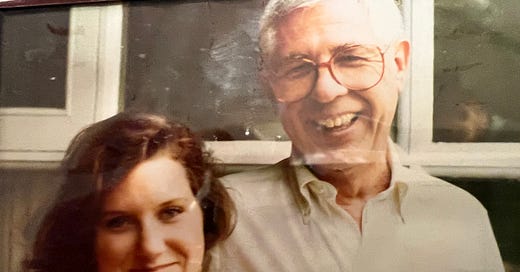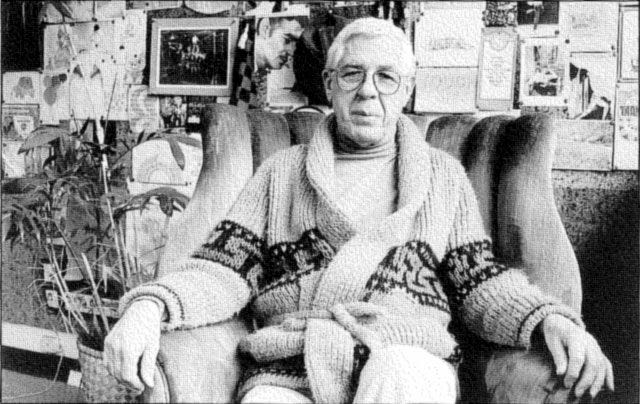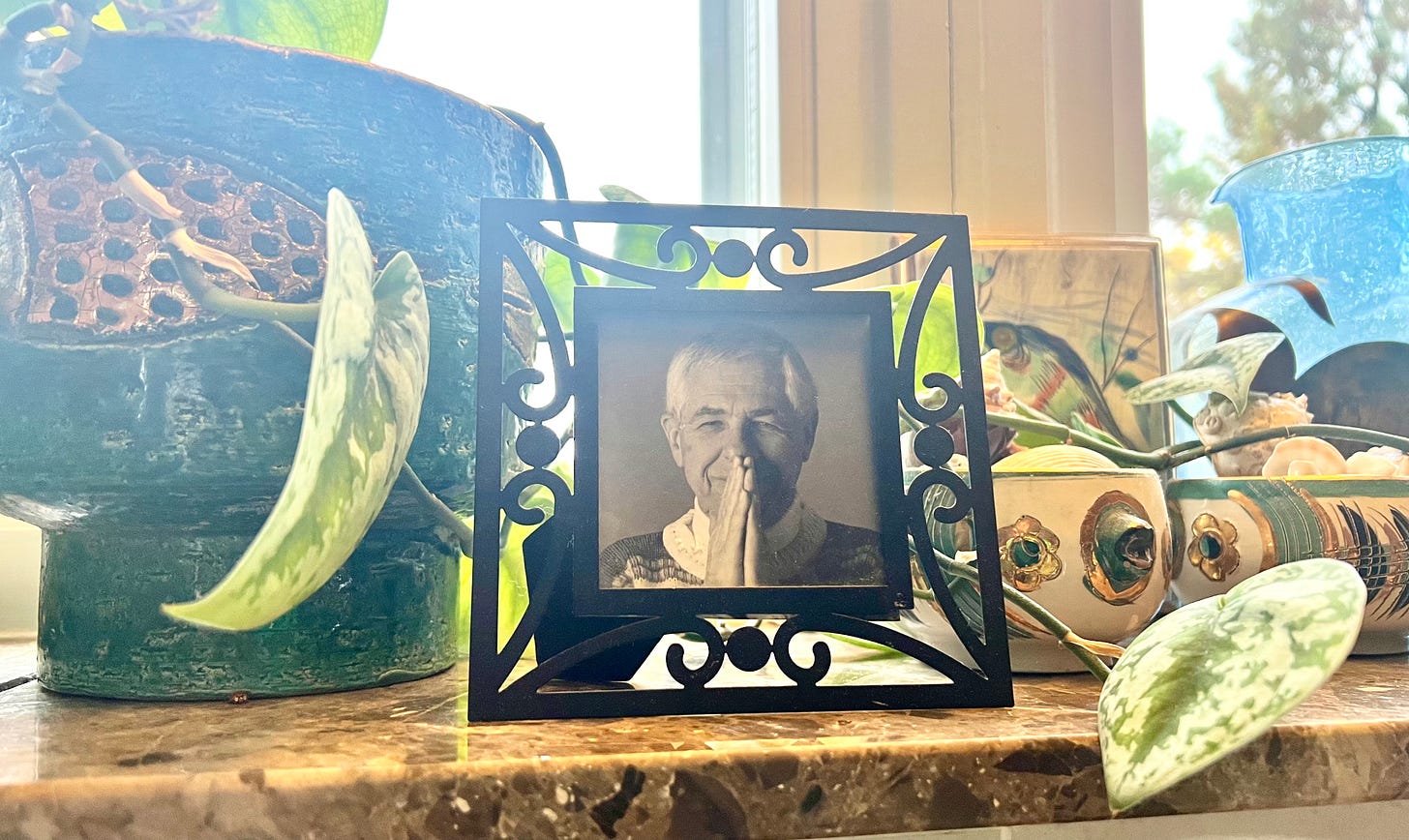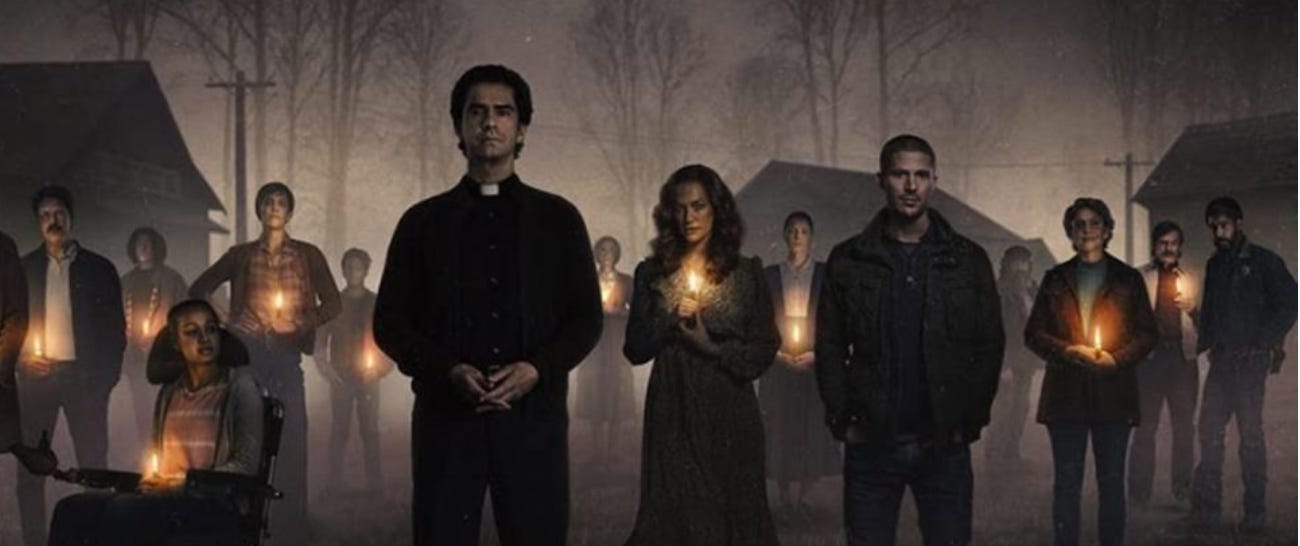Feel free to listen and snuggle someplace warm on this fall day. :)
Surrounded by midwestern brick, I listened on my Walkman to Bono sing about still looking for unfound things as the leaves crunched under foot. I was 800 miles from home without my parents, a first. My friend Mark and I were visiting Wheaton College in suburban Chicago. Granted, I had more interest in being 800 miles away than actually going to this Christian school which didn’t have the major I wanted - theater. In fact, in my interview I asked if I could at least talk to the theater teacher but was told he was too busy.
After my interview, Mark and I were going to grab the train that night and go downtown to “break the pledge,” but in the bored stillness of the rainy afternoon, I went for a walk to the theater to see if I could get in and look around. I walked up to Arena Theatre where students were gathering for rehearsal and they welcomed me in.
I was led me to a room called “Setzuan” after Brecht’s The Good Person of Setzuan. I sat on an old, yellowed shag carpet under a wall of makeup mirrors and watched the cast warm up or what they called “work out.” The cast members each lie on their backs, feet facing a big wall of windows. They spaced out evenly with arms relaxed at their sides. With eyes closed, their bellies slowly undulated with their breath. They lay there in savasana until a kid with shaggy dark hair and beard popped up to sitting. An energetic move. He began to breathe more deeply. As he did, others started popping up like corn on a hot plate. A girl with a hand knit oversized sweater. Another young man with bright red hair and dirty feet. Two girls with long blonde hair knotted into matching braids. Their breathing was audible, muscular. Then one at a time, they’d drop back down and expel all their air in a loud release of sound, then immediately pop back up again and begin the process over.
At this point I noticed the teacher at the front by the windows. A small man with short clipped grey hair and thick glasses. This was Jim Young. He watched the students eagerly then clapped his hands together once. At the sound of the clap the student fell back to the floor and began to roll and bounce on the ground making gibberish noise each time their bodies collided with the floor. It could have been a scene out of an old pentecostal healing service. They all appeared slain in the spirit. As quickly as they started “speaking in tongues” they stopped to yawn and stretch their way up to standing.
Now they all faced the windows and, still in unison, rolled down to stretch their spines and shake out their arms and heads. Once finished, they broke their soft gazes to look around the room and silently couple off. Facing their partner, they moved together in a slow mirrored dance. One couple spread their arms like bird's wings, another moved into an elegant slow motion plie. They never broke eye contact. After a few minutes, again the teacher clapped his hands and instantly each couple broke into a more frenetic conversation of movement allowing deep somatic sounds to echo throughout the room. One person moving/sounding at a time. Again a clap. And now each couple moved to a slow careful practice of bearing each other's weight. They navigated the awkward adjustment of feet and balance. Each found a distinct path but all ended up standing and carrying the full weight of their partner on their backs. The ritual ended and students hugged each other and wandered their way into a group circle.
This had been going on for about 40 minutes and as they held hands in the circle I heard them speak for the first time. They prayed. There weren’t many words, and the words they said were stilted and seemed to come from somewhere deep in their bodies. Sometimes a name was lifted. Sometimes a short phrase of longing was offered and the rest of the circle hummed deeply in agreement. Once the prayers were said and the circle broken, they transitioned into rehearsal grabbing one another in long knowing hugs and short intense conversations along the way.
Something shifted in me sitting under those mirrors and watching these college kids prepare to make something together. I had never witnessed such a powerful and vulnerable community. I had never witnessed such authentic, heart-felt worship. Such embodied practice.
I followed them into the theater and took my seat in the back row of the black box. I watched the two actors playing Pip and Magwich work a short moment of their scene in painstaking detail. I was still reeling and felt woozy, a bit out of my body. The edges of my vision fuzzy.
I lost track of time and when Mark came to find me, I collapsed on him in the parking lot crying. It was the kind of crying you do when you hear certain notes played in a certain order, or when combinations of words bring you to a remembering of something forgotten. Sudden and surprising. I wrote a letter to the teacher when I got home and told him about the profound experience I had watching rehearsal, and told him Wheaton was my first choice.
What I didn’t know then was that what I had fallen in love with in that musty theater rehearsal room was the spirit of community and contemplative practice. Yes, theater was the gateway drug, but it wasn’t until years later that I realized what I truly longed for was community. Most of my life has centered around trying to recreate that first rainy afternoon in Setzuan.

As I finish the first draft of this essay, I press save and then scoot off to meet my friend Kaitlyn who is in town with the Broadway tour of Beetlejuice. Kaitlyn has been running wardrobe crews on the road for most of her adult life since we were roommates at Wheaton. She had hoped to be off the road by now, but the pandemic had other plans. I love that she’s on the road because I get to see her every few years AND since there are theater alumni in every city, she’s a walking font of gossip.
Today we sat on the patio at Sasha’s drinking wine and waxing nostalgic. “It really was a cult,” she says as she sips her Sauvignon Blanc.
“You think?” I ask. “I don’t know.”
“A well meaning cult but a cult nonetheless. Think about it. We all wanted Jim’s attention so desperately. I mean, if he gave you a nickname - you were golden.”
I thought about it and she was right. If you were invited to eat lunch in Jim’s office you felt like Jesus himself had asked you to drop your nets and follow him. The prized lunch consisted of a fifty cent torpedo roll with three slices of cheap cheddar cheese carefully melted on his office radiator and a can of Coke. And yet Jim made this humble lunch into a sacred rite of passage, a passage not everyone was invited to take.
There were other initiation rites, the biggest being the audition to get into “Workout.” Little did I know when I put all my eggs in Wheaton’s proverbial basket that I had to audition. Being a part of this group was the only reason I was there.
And these were coveted spots. There were only as many as had been left open by last year’s seniors. The company of players, thirty total, were committed to one another, to the work and to Jimma.
For the audition, we were not asked to belt out a song or do high kicks or even do soliloquies from Shakespeare, all of which would’ve been fine with me. Instead, we did weird group exercises that made no sense. These were followed by a “performance” of a short monologue without context or character. We were warned “not to act.”
This did not fill me with confidence.
Kaitlyn and I admitted we both still have our cards that were delivered to our mailboxes in the student center thirty-five years ago. The cards simply had a big YES written in Jim’s own hand. Again.. kinda culty. Even so, mine is pinned to the wall in my office.
“There were people who auditioned all four years and never got in,” Kaitlyn reminded me.
You can see, Jim created drama- good and bad. On the first day of Intro to Theater class, one of the most popular classes at the college, we opened the black box doors to find hundreds of helium filled balloons taped to the floor and standing at various heights. Once we pushed through the balloons, we either found a seat in a chair or on a smattering of pillow on the risers. There were plates of peanut butter and jelly sandwiches placed around the room. The only light in the theater came from the projector that incessantly clicked through slides of artwork. Mondrian. Rothko. Francis Bacon. We looked around at each other bewildered. A boy grabbed a sandwich. The projector suddenly switched off and a spotlight came up on a small, wide eyed blonde and a gangly boy with a guitar who didn’t look up from his frets. The blonde started singing Leonard Cohen’s Suzanne.
“It was all a big experiment,” Kaitlyn said. She told me she learned later that Jim would watch who sat in chairs and who chose to lounge on pillows; he made note of who ate the sandwiches. Who were the compliant ones and who were the risk takers? And in some Machiavellian scheme, prior to this first day he’d look through the freshman “Look Book” and find one person whose face and name to memorize. In the middle of that opening day lecture on the nature of Art, he pointed to a boy in the third row and said, “What do you think Matthew? Do you have an opinion on what makes something art?” The student looked up, mouth agape. How had this clown/teacher/guru known his name? He made a sound but no words came out of Matthew’s mouth.
I hadn’t remembered that moment until Kaitlyn reminded me. But when I did, I remember wishing Jim had known my name.
In spite of or maybe because of his guru status, I loved Jim. He was a beautiful albeit flawed soul who taught me more than anyone in my life. About storytelling and its sacredness. About ritual and its impact on community. About Jesus and how he stood for the outsider, the poor, the hungry.
I’ve modeled a lot of my teaching life after Jim. My office walls, like his, are covered in memorabilia like a quilted mishmash of iconography paying homage to nostalgia. My classes are structured like his. The exercises I use, mostly his. We share a commitment to telling important stories. The changes I’ve made though, have all been in deference to my students' autonomy and the intentional un-cultish community I’ve tried to create.
I don’t shroud things in mystery like Jim. When a student asks why we’re doing something I tell them. I give students more choice in the pieces they perform. I don’t pummel kids’ egos during note sessions. (Jim once told us after a run we were “offering shit to God.”) I try to underplay the stressful audition process rather than heighten it. I do not make any decisions alone. I’m sure I have students that wouldn’t believe this, but I’ve always tried very deliberately to de-center myself and my voice.
When students perform in my class their peers are the first to give feedback. The performers call on each other and they look at each other, not me. At the end I simply summarize their critiques translating them into language I want them to learn.
As Kaitlyn and I sat on the patio on our second round, a group of my students walked by all in monochromatic outfits and face paint to match. It was a day off and the kids had organized a team scavenger hunt.
“Hey guys!” I called.
“Hey Kdubs.” They waved at me and quickly moved on. I was painfully aware of my unguru-like status and also quietly proud.
I had met them up at the park earlier that day to cheer them on. These were kids at their best - kind, cooperative, playful and willing to take risks. I didn’t need to dig into the psychology of group think to see this. These are kids who, yes, like being on stage and maybe value the craft of storytelling, but above all, these kids want to be connected. They want to belong. They want to be seen and known as the unique human beings they are, not by me, their teacher, or at least not solely by me. They want the belonging of friendship and that’s what I want for them.
This is my last year as their teacher. I’m retiring in June. So I’m doing a lot of reflecting on what it has meant to me to be a teacher, but this morning I stumbled on an article Jim wrote in 1995, the year he retired. He was asked to write a faculty spotlight column called “On My Mind.”
“But as I sat down in front of my precious friend, the Smith-Corona portable, newly-equipped with a grafted-on “t,” I breathed a prayer for this writing. I knew at once that the name of Jesus was the noun that ‘on my mind’ modified,” he writes.
Jim was a luddite that loved broken things and broken people. He once brought home a man living on the street, fed him and gave him a bed for the night. In the morning Jim left him sleeping and went to work. You can guess what happened. The man robbed him. But Jim said he never regretted trusting and giving the man a place to sleep and some food because that’s what Jesus would have done.
“Since I joined the Wheaton faculty in 1973, I have grown significantly and changed immensely. You might say I have gone through a major ‘p.t.,’ or prepositional transition. Increasingly I have, through God’s grace and very slowly, moved from the ‘on’ to an ‘in.’ I am far from having completed the ‘p.t.’ but through the writings of Thomas Merton, Alan Jones, and Henri Nouwen, and through the liturgy of the church at which I worship, I am creeping toward Paul’s invitation to ‘let this mind dwell in me.’ “
Jim loved acronyms. Again a little culty form of insider language. He would always call us out on our need for “IG,” telling us we needed to practice “DG.” Instant gratification vs delayed gratification.
But the resonate part of this quote for me is his referencing Merton and Nouwen. I was a 19 year old Evangelical kid going to a school with a Billy Graham Center and yet I was reading Merton. I was attending a church that valued liturgy. And when we lay prostrate in those opening moments of workout, our breath undulating, we were praying the Jesus Prayer, an ancient contemplative breath prayer.
“I am beginning to experience at least two significant life changes. One is that my time with Jesus is far less ‘agendized.’ It has become more intimate, and I no longer come to him with a list of my needs and go from him with a list of errands I then ‘sacrificially’ perform. I sense more times with Jesus when I feel like the monk in the French monastery who often stayed after morning mass to sit in chapel. One day as he sat there, the abbot approached him and asked, ‘Why do you sit here when your brothers are in the garden, in the kitchen, in the library about their work? All you are doing is looking at the Crucifix.’ The monk looked up and said, ‘Well, it’s just that I look at him, he looks at me, and we are happy together.’ Dwelling on the name of Jesus leads me toward that intimacy.”
Jim led retreats for us in small chapels and created space for contemplation. We had Christmas celebrations where we made each other homemade gifts; and during Lent, a foot washing ceremony.
“Another change as the mind of Jesus moves in, is that so much of what I sense Jesus meant by “the world” seems to pale into almost nothing. As his mind moves in, I find myself being called to (and by no means always answering) a smaller house, fewer clothes, a small car, a nurturing of our earth and conserving of its resources, to non-busyness, to a simpler lifestyle. So much of the “world” seems infinitely less alluring than the “joy divine” provided by the “sweetest name I know.” Try something with me. Have him in your mind. Breathe aloud the name of Jesus four times a day. See where the Holy Spirit takes the dialog.”
Jim walked to school each day, a ritual I’ve started this year as we’ve become a one car family. Jim danced really. If you saw him his arms would be flinging to and fro. He was praying for each and everyone of us. He memorized all the workout graduates and where they lived. Starting in Washington state and ending in New York City he’d say each of our names out loud on his daily walk to Jenks Hall. His life was a living, dancing sacrament.
My senior year we did an adaptation of Fredrick Buechner’s The Final Beast for our new play festival. The year previously we worked with Chaim Potok and Madeleine L’Engle and this year we’d get to meet Buechner. I was cast as Lillian Flagg, a Ruth Gordon-like crazy lady that was a healer. When Buechner died a few years ago I reread Beast. To my utter surprise I realized Lillian wasn’t a healer so much as a spiritual director. It made me feel close to him, even long after Jim has crossed the veil, to know that he had seen me in that role. A role that I have chosen for my second half of life. A life focused on contemplation and listening and creating space for healing.
For 36 years Jim has been teaching me; from my pimply pre-college self to now, at the end of my own teaching career. He’s taught me things I’ve adopted as my own and he’s taught me things that I’ve stayed far away from. When you coach or sponsor or lead any kind of group that meets regularly over years to do meaningful work together, you’re never gonna get it all right. There’s always going to be the impulse to create a little cult of personality and sometimes when we try to stay clear of this we come off as distant. I hope that I’ve loved my students into their own freedom and confidence, that my voice isn’t the loudest voice and my opinion, while valued, is no more important than their own.
Check It Out!
(A)THEIST PODCAST: Are you keeping up with the podcast!? If not, it’s time! Next week we have a special interview with Oliver Burkeman, author of 4000 Weeks: Time Management for Mortals. Don’t miss it! Here’s the lead up conversation.
ECKHART AND TATTOOS: I got lots of great reactions to this post a few months ago. I’ve added to it and done another draft which I think opens up the piece quite a bit. You can check it out here.
The Tattoos I Still Hide from my Parents
Welcome back everyone from the long hot summer! I know it’s still summer, but I’m back at school so it feels over. This year I’m coming back as both a teacher and a student as I’ve started my first classes in a Master’s degree in Theopoetics and Writing at a co-led program through Bethany Theological Seminary and Earlham School of Religion. I’m taking …
HALLOWEEN! Check out this post from a few years ago on Mike Flannigan’s Midnight Mass. if you haven’t watched his House of Usher this season I recommend. I still prefer Mass but Usher is pretty clever, particularly if your a fan of Poe.
What if Stephen King and Richard Rohr had a horror baby?
The Exorcist came out when I was 13 years old. My Baptist preacher grandfather was visiting us at the time and he made arrangements to go see the movie in the theater. Now understand that my father growing up was not allowed to go to movies or listen to rock music. He was allowed to see
That’s it friends. Thanks for reading, commenting and being part of my little community here on Substack - a small but mighty group.
Be well,
Kelley








I love reading about this cult like personality and how he impacted your life and your teaching!
Just beautiful. The "workout" makes me realize that all good performance is a kind of Pentecostalism, the indwelling Spirit busting out into the open. This is also a reminder that there are good things about cults. They wouldn't exist if there weren't. If you ever decide to switch from non-guru to guru status, let me know. I'd be happy to join your cult.